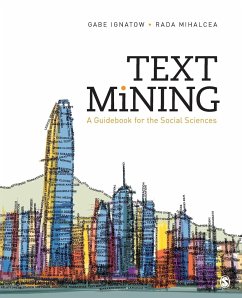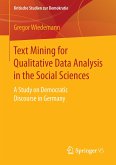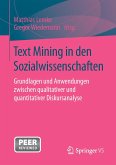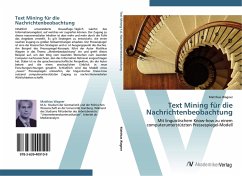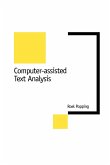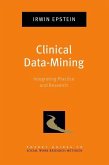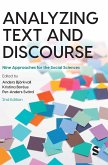- Broschiertes Buch
- Merkliste
- Auf die Merkliste
- Bewerten Bewerten
- Teilen
- Produkt teilen
- Produkterinnerung
- Produkterinnerung
Online communities generate massive volumes of natural language data and the social sciences continue to learn how to best make use of this new information and the technology available for analyzing it. Text Mining brings together a broad
Andere Kunden interessierten sich auch für
![Text Mining for Qualitative Data Analysis in the Social Sciences Text Mining for Qualitative Data Analysis in the Social Sciences]() Gregor WiedemannText Mining for Qualitative Data Analysis in the Social Sciences54,99 €
Gregor WiedemannText Mining for Qualitative Data Analysis in the Social Sciences54,99 €![Text Mining in den Sozialwissenschaften Text Mining in den Sozialwissenschaften]() Text Mining in den Sozialwissenschaften54,99 €
Text Mining in den Sozialwissenschaften54,99 €![Text Mining für die Nachrichtenbeobachtung Text Mining für die Nachrichtenbeobachtung]() Matthias WagnerText Mining für die Nachrichtenbeobachtung42,00 €
Matthias WagnerText Mining für die Nachrichtenbeobachtung42,00 €![The Dangerous Art of Text Mining The Dangerous Art of Text Mining]() Jo GuldiThe Dangerous Art of Text Mining111,99 €
Jo GuldiThe Dangerous Art of Text Mining111,99 €![Computer-Assisted Text Analysis Computer-Assisted Text Analysis]() Roel PoppingComputer-Assisted Text Analysis47,99 €
Roel PoppingComputer-Assisted Text Analysis47,99 €![Clinical Data-Mining Clinical Data-Mining]() Irwin EpsteinClinical Data-Mining53,99 €
Irwin EpsteinClinical Data-Mining53,99 €![Analyzing Text and Discourse Analyzing Text and Discourse]() Anders BjörkvallAnalyzing Text and Discourse131,99 €
Anders BjörkvallAnalyzing Text and Discourse131,99 €-
-
-
Online communities generate massive volumes of natural language data and the social sciences continue to learn how to best make use of this new information and the technology available for analyzing it. Text Mining brings together a broad
Hinweis: Dieser Artikel kann nur an eine deutsche Lieferadresse ausgeliefert werden.
Hinweis: Dieser Artikel kann nur an eine deutsche Lieferadresse ausgeliefert werden.
Produktdetails
- Produktdetails
- Verlag: Sage Publications, Inc
- Seitenzahl: 208
- Erscheinungstermin: 11. Mai 2016
- Englisch
- Abmessung: 235mm x 191mm x 11mm
- Gewicht: 399g
- ISBN-13: 9781483369341
- ISBN-10: 148336934X
- Artikelnr.: 44159933
- Herstellerkennzeichnung
- Libri GmbH
- Europaallee 1
- 36244 Bad Hersfeld
- gpsr@libri.de
- Verlag: Sage Publications, Inc
- Seitenzahl: 208
- Erscheinungstermin: 11. Mai 2016
- Englisch
- Abmessung: 235mm x 191mm x 11mm
- Gewicht: 399g
- ISBN-13: 9781483369341
- ISBN-10: 148336934X
- Artikelnr.: 44159933
- Herstellerkennzeichnung
- Libri GmbH
- Europaallee 1
- 36244 Bad Hersfeld
- gpsr@libri.de
Gabe Ignatow is Professor of Sociology and Director of Graduate Studies at the University of North Texas. His research interests are mainly in the areas of sociological theory, digital research methods, cognitive social science, and the philosophy of social science. His most recent books are Text Mining and An Introduction to Text Mining, both coauthored with Rada Mihalcea (University of Michigan). He is also a coeditor, with Wayne Brekhus (University of Missouri), of the Oxford Handbook of Cognitive Sociology.
Part I: Digital Texts, Digital Social Science
1. Social Science and the Digital Text Revolution
Learning Objectives
Introduction
History of Text Analysis
Risk and Rewards of Text Mining for the Social Sciences
Social Data from Digital Environments
Theory and Metatheory
Ethics of Text Mining
Organization of This Volume
2. Research Design Strategies
Learning Objectives
Introduction
Levels of Analysis
Strategies for Document Selection and Sampling
Types of Inferential Logic
Approaches to Research Design
Part II: Text Mining Fundamentals
3. Web Crawling and Scraping
Learning Objectives
Introduction
Web Statistics
Web Crawling
Web Scraping
Software for Web Crawling and Scraping
4. Lexical Resources
Learning Objectives
Introduction
WordNet
Roget¿s Thesaurus
Linguistic Inquiry and Word Count
General Inquirer
Wikipedia
Downloadable Lexical Resources and APIs
5. Basic Text Processing
Learning Objectives
Introduction
Tokenization
Stopword Removal
Stemming and Lemmatization
Text Statistics
Language Models
Other Text Processing
Software for Text Processing
6. Supervised Learning
Learning Objectives
Feature Representation and Weighting
Supervised Learning Algorithms
Evaluation of Supervised Learning
Software for Supervised Learning
Part III: Text Analysis Methods from the Humanities and Social Sciences
7. Thematic Analysis, QDAS, and Visualization
Learning Objectives
Thematic Analysis
Qualitative Data Analysis Software
Visualization Tools
8. Narrative Analysis
Learning Objectives
Introduction
Conceptual Foundations
Mixed Methods of Narrative Analysis
Automated Approaches to Narrative Analysis
Future Directions
Specialized Software for Narrative Analysis
9. Metaphor Analysis
Learning Objectives
Introduction
Theoretical Foundations
Qualitative Metaphor Analysis
Mixed Methods of Metaphor Analysis
Automated Metaphor Identification Methods
Software for Metaphor Analysis
Part IV: Text Mining Methods from Computer Science
10. Word and Text Relatedness
Learning Objectives
Introduction
Theoretical Foundations
Corpus-based and Knowledge-based Measures of Relatedness
Software and Datasets for Word and Text Relatedness
Further Reading
11. Text Classification
Learning Objectives
Introduction
Applications of Text Classification
Representing Texts for Supervised Text Classification
Text Classification Algorithms
Bootstrapping in Text Classifcation
Evaluation of Text Classification
Software and Datasets for Text Classification
12. Information Extraction
Learning Objectives
Introduction
Entity Extraction
Relation Extraction
Web Information Extraction
Template Filling
Software and Datasets for Information Extraction and Text Mining
13. Information Retrieval
Learning Objectives
Introduction
Theoretical Foundations
Components of an Information Retrieval System
Information Retrieval Models
The Vector-Space Model
Evaluation of Information Retrieval Models
Web-Based Information Retrieval
Software and Datasets for Information Retrieval
14. Sentiment Analysis
Learning Objectives
Introduction
Theoretical Foundations
Lexicons
Corpora
Tools
Future Directions
Software and Datasets for Word and Text Relatedness
15. Topic Models
Learning Objectives
Introduction
Digital Humanities
Political Science
Sociology
Software for Topic Modeling
V: Conclusions
16. Text Mining, Text Analysis, and the Future of Social Science
Introduction
Social and Computer Science Collaboration
1. Social Science and the Digital Text Revolution
Learning Objectives
Introduction
History of Text Analysis
Risk and Rewards of Text Mining for the Social Sciences
Social Data from Digital Environments
Theory and Metatheory
Ethics of Text Mining
Organization of This Volume
2. Research Design Strategies
Learning Objectives
Introduction
Levels of Analysis
Strategies for Document Selection and Sampling
Types of Inferential Logic
Approaches to Research Design
Part II: Text Mining Fundamentals
3. Web Crawling and Scraping
Learning Objectives
Introduction
Web Statistics
Web Crawling
Web Scraping
Software for Web Crawling and Scraping
4. Lexical Resources
Learning Objectives
Introduction
WordNet
Roget¿s Thesaurus
Linguistic Inquiry and Word Count
General Inquirer
Wikipedia
Downloadable Lexical Resources and APIs
5. Basic Text Processing
Learning Objectives
Introduction
Tokenization
Stopword Removal
Stemming and Lemmatization
Text Statistics
Language Models
Other Text Processing
Software for Text Processing
6. Supervised Learning
Learning Objectives
Feature Representation and Weighting
Supervised Learning Algorithms
Evaluation of Supervised Learning
Software for Supervised Learning
Part III: Text Analysis Methods from the Humanities and Social Sciences
7. Thematic Analysis, QDAS, and Visualization
Learning Objectives
Thematic Analysis
Qualitative Data Analysis Software
Visualization Tools
8. Narrative Analysis
Learning Objectives
Introduction
Conceptual Foundations
Mixed Methods of Narrative Analysis
Automated Approaches to Narrative Analysis
Future Directions
Specialized Software for Narrative Analysis
9. Metaphor Analysis
Learning Objectives
Introduction
Theoretical Foundations
Qualitative Metaphor Analysis
Mixed Methods of Metaphor Analysis
Automated Metaphor Identification Methods
Software for Metaphor Analysis
Part IV: Text Mining Methods from Computer Science
10. Word and Text Relatedness
Learning Objectives
Introduction
Theoretical Foundations
Corpus-based and Knowledge-based Measures of Relatedness
Software and Datasets for Word and Text Relatedness
Further Reading
11. Text Classification
Learning Objectives
Introduction
Applications of Text Classification
Representing Texts for Supervised Text Classification
Text Classification Algorithms
Bootstrapping in Text Classifcation
Evaluation of Text Classification
Software and Datasets for Text Classification
12. Information Extraction
Learning Objectives
Introduction
Entity Extraction
Relation Extraction
Web Information Extraction
Template Filling
Software and Datasets for Information Extraction and Text Mining
13. Information Retrieval
Learning Objectives
Introduction
Theoretical Foundations
Components of an Information Retrieval System
Information Retrieval Models
The Vector-Space Model
Evaluation of Information Retrieval Models
Web-Based Information Retrieval
Software and Datasets for Information Retrieval
14. Sentiment Analysis
Learning Objectives
Introduction
Theoretical Foundations
Lexicons
Corpora
Tools
Future Directions
Software and Datasets for Word and Text Relatedness
15. Topic Models
Learning Objectives
Introduction
Digital Humanities
Political Science
Sociology
Software for Topic Modeling
V: Conclusions
16. Text Mining, Text Analysis, and the Future of Social Science
Introduction
Social and Computer Science Collaboration
Part I: Digital Texts, Digital Social Science
1. Social Science and the Digital Text Revolution
Learning Objectives
Introduction
History of Text Analysis
Risk and Rewards of Text Mining for the Social Sciences
Social Data from Digital Environments
Theory and Metatheory
Ethics of Text Mining
Organization of This Volume
2. Research Design Strategies
Learning Objectives
Introduction
Levels of Analysis
Strategies for Document Selection and Sampling
Types of Inferential Logic
Approaches to Research Design
Part II: Text Mining Fundamentals
3. Web Crawling and Scraping
Learning Objectives
Introduction
Web Statistics
Web Crawling
Web Scraping
Software for Web Crawling and Scraping
4. Lexical Resources
Learning Objectives
Introduction
WordNet
Roget¿s Thesaurus
Linguistic Inquiry and Word Count
General Inquirer
Wikipedia
Downloadable Lexical Resources and APIs
5. Basic Text Processing
Learning Objectives
Introduction
Tokenization
Stopword Removal
Stemming and Lemmatization
Text Statistics
Language Models
Other Text Processing
Software for Text Processing
6. Supervised Learning
Learning Objectives
Feature Representation and Weighting
Supervised Learning Algorithms
Evaluation of Supervised Learning
Software for Supervised Learning
Part III: Text Analysis Methods from the Humanities and Social Sciences
7. Thematic Analysis, QDAS, and Visualization
Learning Objectives
Thematic Analysis
Qualitative Data Analysis Software
Visualization Tools
8. Narrative Analysis
Learning Objectives
Introduction
Conceptual Foundations
Mixed Methods of Narrative Analysis
Automated Approaches to Narrative Analysis
Future Directions
Specialized Software for Narrative Analysis
9. Metaphor Analysis
Learning Objectives
Introduction
Theoretical Foundations
Qualitative Metaphor Analysis
Mixed Methods of Metaphor Analysis
Automated Metaphor Identification Methods
Software for Metaphor Analysis
Part IV: Text Mining Methods from Computer Science
10. Word and Text Relatedness
Learning Objectives
Introduction
Theoretical Foundations
Corpus-based and Knowledge-based Measures of Relatedness
Software and Datasets for Word and Text Relatedness
Further Reading
11. Text Classification
Learning Objectives
Introduction
Applications of Text Classification
Representing Texts for Supervised Text Classification
Text Classification Algorithms
Bootstrapping in Text Classifcation
Evaluation of Text Classification
Software and Datasets for Text Classification
12. Information Extraction
Learning Objectives
Introduction
Entity Extraction
Relation Extraction
Web Information Extraction
Template Filling
Software and Datasets for Information Extraction and Text Mining
13. Information Retrieval
Learning Objectives
Introduction
Theoretical Foundations
Components of an Information Retrieval System
Information Retrieval Models
The Vector-Space Model
Evaluation of Information Retrieval Models
Web-Based Information Retrieval
Software and Datasets for Information Retrieval
14. Sentiment Analysis
Learning Objectives
Introduction
Theoretical Foundations
Lexicons
Corpora
Tools
Future Directions
Software and Datasets for Word and Text Relatedness
15. Topic Models
Learning Objectives
Introduction
Digital Humanities
Political Science
Sociology
Software for Topic Modeling
V: Conclusions
16. Text Mining, Text Analysis, and the Future of Social Science
Introduction
Social and Computer Science Collaboration
1. Social Science and the Digital Text Revolution
Learning Objectives
Introduction
History of Text Analysis
Risk and Rewards of Text Mining for the Social Sciences
Social Data from Digital Environments
Theory and Metatheory
Ethics of Text Mining
Organization of This Volume
2. Research Design Strategies
Learning Objectives
Introduction
Levels of Analysis
Strategies for Document Selection and Sampling
Types of Inferential Logic
Approaches to Research Design
Part II: Text Mining Fundamentals
3. Web Crawling and Scraping
Learning Objectives
Introduction
Web Statistics
Web Crawling
Web Scraping
Software for Web Crawling and Scraping
4. Lexical Resources
Learning Objectives
Introduction
WordNet
Roget¿s Thesaurus
Linguistic Inquiry and Word Count
General Inquirer
Wikipedia
Downloadable Lexical Resources and APIs
5. Basic Text Processing
Learning Objectives
Introduction
Tokenization
Stopword Removal
Stemming and Lemmatization
Text Statistics
Language Models
Other Text Processing
Software for Text Processing
6. Supervised Learning
Learning Objectives
Feature Representation and Weighting
Supervised Learning Algorithms
Evaluation of Supervised Learning
Software for Supervised Learning
Part III: Text Analysis Methods from the Humanities and Social Sciences
7. Thematic Analysis, QDAS, and Visualization
Learning Objectives
Thematic Analysis
Qualitative Data Analysis Software
Visualization Tools
8. Narrative Analysis
Learning Objectives
Introduction
Conceptual Foundations
Mixed Methods of Narrative Analysis
Automated Approaches to Narrative Analysis
Future Directions
Specialized Software for Narrative Analysis
9. Metaphor Analysis
Learning Objectives
Introduction
Theoretical Foundations
Qualitative Metaphor Analysis
Mixed Methods of Metaphor Analysis
Automated Metaphor Identification Methods
Software for Metaphor Analysis
Part IV: Text Mining Methods from Computer Science
10. Word and Text Relatedness
Learning Objectives
Introduction
Theoretical Foundations
Corpus-based and Knowledge-based Measures of Relatedness
Software and Datasets for Word and Text Relatedness
Further Reading
11. Text Classification
Learning Objectives
Introduction
Applications of Text Classification
Representing Texts for Supervised Text Classification
Text Classification Algorithms
Bootstrapping in Text Classifcation
Evaluation of Text Classification
Software and Datasets for Text Classification
12. Information Extraction
Learning Objectives
Introduction
Entity Extraction
Relation Extraction
Web Information Extraction
Template Filling
Software and Datasets for Information Extraction and Text Mining
13. Information Retrieval
Learning Objectives
Introduction
Theoretical Foundations
Components of an Information Retrieval System
Information Retrieval Models
The Vector-Space Model
Evaluation of Information Retrieval Models
Web-Based Information Retrieval
Software and Datasets for Information Retrieval
14. Sentiment Analysis
Learning Objectives
Introduction
Theoretical Foundations
Lexicons
Corpora
Tools
Future Directions
Software and Datasets for Word and Text Relatedness
15. Topic Models
Learning Objectives
Introduction
Digital Humanities
Political Science
Sociology
Software for Topic Modeling
V: Conclusions
16. Text Mining, Text Analysis, and the Future of Social Science
Introduction
Social and Computer Science Collaboration

